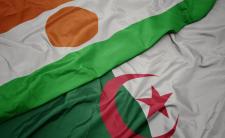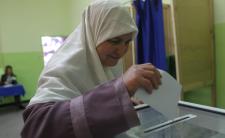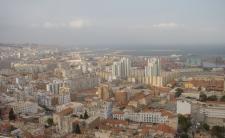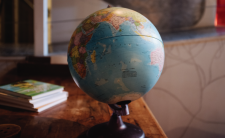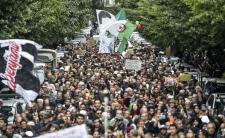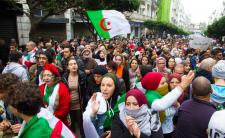Introduction
The People’s Democratic Republic of Algeria covers approximately 2.4 million square kilometres of North Africa’s Mediterranean coast and is bounded on the east by Libya and Tunisia, on the south by Niger, Mali, and Mauritania, and on the west by Western Sahara and Morocco. Algeria is home to nearly 35 million people, the vast majority of whom are Arab-Berbers and Sunni-Muslim. The population is predominantly urban, and 2.7 million people live in the capital of Algiers, located on the northern coast.
Political developments
Algeria was originally home to the Berbers, a nation formed from the native populations of North Africa, but the Phoenician traders colonized the area around 900 BC. A period of Roman rule followed, but the Arabs arrived in Algeria in the 8th century, introducing the religion of Islam. The Ottomans took control of the area in 1518, but the French annexed and colonized Algeria in 1830. The Colons (colonists), or the pieds noirs, not only controlled the government, but also amassed a large portion of the nation’s wealth. The Colons were able to block or delay all attempts at reform through their influence in Paris. This led to popular uprisings in 1933, calling for social, political, and economic reforms in favour of the Algerians. However, the French government responded by passing even stricter security laws. The Algerians fought with the French in World Wars I and II, but Muslim leader Ferhat Abbas presented the French administration with the Manifesto of the Algerian People in March 1943. This Manifesto, signed by Algerian nationalist and international leaders, demanded a new constitution that would give political and legal equality to the Muslims. However, the restored French government responded by instituting its own reforms which granted full French citizenship, and thus political representation, only to “meritorious” Algerian Muslims, an arbitrarily selected group that represented only a small fraction of the population. On 8 May 1945, popular protests erupted across the country, and were met with French resistance. The French National Assembly attempted to reduce the tension and maintain their hold on their empire by passing the Organic Statute of Algeria, a document that proposed the creation of a bicameral Algerian Assembly split between Colons and Muslims, but both communities rejected or abstained from the referendum vote for its passage. In the end, the French were not able to quell nationalist sentiment, and a bloody independence war began on 1 November 1954 when the National Liberation Front launched guerrilla-style attacks throughout the country.
Constitutional developments: 1962-2011
On 25 September 1962, Algeria gained independence from France and a new constitution was passed the following year. The National Liberation Front’s Ahmed ben Bella was formally elected President after overseeing the constitutional drafting process as the nation’s Premier. Under Algeria’s first constitution, Ben Bella acted not only as the Chief of State, the Head of Government, and the Supreme Commander of the Armed Forces, but was able to draft and execute policies. There was no system for effective institutional checks on executive power under this constitution as the president could act most of the times without legislative approval. On 19 June 1965, Colonel Houari Boumedienne deposed Ben Bella in a bloodless military coup, suspended the constitution. A new constitution was promulgated in November 1976 and Boumedienne was elected the country’s new President. The constitution created a single-party system and allowed the President to retain many of his sweeping powers. Boumedienne died just two years later and his successor, Colonel Chadli Bendjedid began a period of aggressive reform to liberalize and decentralize the economy. However, these reforms did not end high unemployment or ease harsh economic conditions, leading to increased Islamic extremism.
Student strikes and riots began in October 1988 amid allegations of corruption, prompting the government to declare a state of emergency. In response to these riots, a new constitution was drafted and passed by referendum in February 1989, creating a multi-party system, granting greater personal freedoms, and minimizing the role of the military. However, the ruling NLF party became concerned with the possibility that another political party could take power through democratic elections, prompting President Benjadid to dissolve the Parliament and resign in January 1992. A five-member High Council of State cancelled the forthcoming elections and arrested political opponents while violent demonstrations protesting these policies were held throughout the country. The NLF responded by banning its major political opposition party, the Islamic Salvation Front, and declared a state of emergency. A new constitution was passed in 1996, creating a bicameral legislature, reinforcing the powers of the President, and banning all Islamist parties. The new President Abdelaziz Boutefilka won the 1999 elections, despite allegation of electoral fraud, and set about restoring peace to Algeria. His proposed Civil Concord, granting amnesty to thousands of political opponents of the NLF passed a nationwide referendum in 2000, and he formed national commissions to reform the education system, the judiciary, and the government. He won what are considered to be the first freely democratic elections in April 2004, and another term in 2009 after the constitution was amended to remove presidential term limits in 2008. In response to the 2011 Arab Spring protests that spread to Algeria, Boutefilka lifted the 19-year old state of emergency and promised further constitutional amendments to introduce more representative democracy.
1996 Constitution
The 1996 Constitution makes multiple references to Algeria’s Arab and Islamic heritage, stating that it is a land of Islam and an integral part not only of the Great Maghreb Arab nation but also of the Mediterranean and African region. It declares that Islam is the nation of the state and acknowledges its ethnic plurality by recognizing, via 2002 amendment, the Berber’s language of Tamazight as one of its national languages. The Constitution also emphasizes that the people are the source of national sovereignty and that they are to exercise this power through referendums and the election of representatives. While it does not mention the word “socialism” as in the previous constitution, it does state the Algeria was founded on the principles of democracy and social justice, and includes many personal and political freedoms. While the Constitution recognizes a multi-party system, it bans any religious parties. It creates a system divided between a strong President, a Prime Minister and Cabinet, a bicameral Parliament, and a judicial system headed by a Supreme Court and Constitutional Council.
Executive branch
The President of Algeria is elected directly to five year terms, and as of the 2008 amendments, has no term limits. In order to run for the office, a candidate must be solely of Algerian citizenship, be a Muslim, have an Algerian spouse, and have either a documented participation in the war for independence from France, or, if not old enough to have participated, documentation that their parents did not fight for the French in that war. The Constitution gives a great deal of power to the President, who is not only the Head of State but also the Supreme Commander of the Armed Forces, responsible for national defence and foreign policy. As the Chief Executive, he also has the power to preside over the Council of Ministers, dismiss the government, and sign presidential decrees. In addition to these powers, the President may also grant pardons, submit matters for referendum, and ratify treaties. Civilian and military employees must also be appointed by the President. If the President wishes to declare war, he must first consult with, amongst others, the two presidents of Parliament, and if it is passed, then the constitution is suspended and he is granted all emergency powers. The Prime Minister, appointed by the President, heads the Cabinet. The Ministers are nominated by the Prime Minister and appointed by the President, and they are tasked with implementing and coordinating programs approved by the lower house of Parliament.
Legislative branch
The Parliament is composed of two houses: the lower National People’s Assembly and the upper Council of the Nation. The National People’s Assembly’s deputies are elected by direct vote to 5 year terms. It possesses the exclusive power to censure the government or any of its members by a two-thirds vote. The Council of the Nation may only contain half the members of the National People’s Assembly, serving six year terms. Two-thirds of its members are elected by the regional Communal People’s Assemblies and the People’s Assemblies of the Wilaya, while the others are appointed by the President. The Prime Minster or at least 20 members of the lower house may introduce a bill. The upper house may only deliberate on the bill as presented by the lower house, and it passes these bills by a three-fourths majority vote. A law is then promulgated by the President. A presidential veto can be overridden by a two-thirds vote of the National People’s Assembly. The Parliament may pass legislation addressing fundamental rights, personal status and family law, nationality, judicial organization, general rules of civil and criminal procedure, and the national budget.
Judicial branch
The judiciary of Algeria is headed by two different courts: the Supreme Court and the Constitutional Council. The Supreme Court is the main judicial regulatory authority, overseeing all activity of the courts and tribunals, while a Council of State regulates all administrative matters such as retirement and discipline of judges. Together, it is their responsibility to ensure judicial integrity and independence. Any disagreements or conflicts between the Supreme Court and the Council of State are decided by another special tribunal, and the organization and functions of these three bodies are determined by law. The Constitutional Council addresses all matters of constitutional interpretation and review. It contains 9 members: three appointed by the President, two elected by the National People’s Assembly, two elected by the Council of the Nation, and two named by the Supreme Court and Council of State. The members of the Constitutional Council hold 6 year terms, but hald of those not appointed by the President are renewed every three years. It is the responsibility of the Council to watch over the constitutionality of all referendums, elections, treaties, and laws. When requested by the President or either of the two Presidents of Parliament, the Council may also review the constitutionality of organic laws and the internal regulation of the Parliament.
System of government under 1996 Constitution
Timeline
| 1830 | French seized Algeri and for the next years tried to colonize the rest of the country. |
| March 1943 | Muslim leader Ferhat Abbas presents French with Manifesto of the Algerian People, demanding more Muslim political and legal equality |
| 1 November 1954 | National Liberation Front launches attacks on French targets across Algeria, prompting an independence war |
| 3 July 1962 | Algeria gains its independence from France |
| 1963 | Constitution passes and NLF’s Ahmed Ben Bella elected President |
| 1965 | Colonel Houari Boumedienne deposes Ben Bella in bloodless coup |
| November 1976 | New constitution gives President Boumedieene broad powers and creates single party system |
| 1978 | Boumedienne dies and is replaced by Colonel Chadli Bendjedid, who begins a period of reform |
| October 1988 | Student led strikes against corruption prompt government to declare state of emergency |
| February 1989 | New constitution passed creating multi-party system, granting greater personal freedoms, and minimizing role of the military |
| 1991 | Elections lead to victory for opposition party, the Islamic Salvation Front |
| January 1992 | President Benjadid dissolves Parliament and resigns, while High Council of State cancels forthcoming elections and jails political opponents, prompting violent protests and a state of emergency |
| 1996 | Constitution passed creating bicameral legislature, reinforcing powers of the President, and banning Islamist parties |
| 1999 | Abdel Boutefilka wins presidential elections amid allegations of electoral fraud |
| 2000 | Nationwide referendum passes President Boutefilka’s amnesty plan, the Civil Concord, and national reform commission formed to address the education, judicial, and government systems |
| April 2004 | President Boutefilka wins re-election in first freely democratic elections |
| 2008 | Constitutional amendment removes presidential term limits |
| 2009 | President Boutefilka wins re-election to third term |
| 2011 | Arab Spring protests erupt across the country, prompting President Boutefilka to lift the state of emergency and promise constitutional amendments |
Bibliography
- The Permanent Mission of Algeria to the UN. The Constitution of the People’s Democratic Republic of Algeria. 2005. Web. 5 Aug 2011.
- “Country Profile: Algeria.” The Library of Congress – Federal Research Division. 2008. Web. 5 Aug 2011.
- “Algeria.” Foreign and Commonwealth Office. 2011. Web. 5 Aug 2011.
- United States. CIA World Factbook: Algeria. , 2011. Web. 8 Jul 2011.
- "Algeria Country Profile." 26/02/2011. BBC News. Web. 5 Aug 2011.
- ”Consultations End for Algeria’s New Constitution.” 22/06/2011. CBS News. Web. 5 Aug 2011.
- ”Algerian President Announces the Constitution will be Revised.” 15/04/2011. CNN World. Web. 5 Aug 2011.
| Branch | Hierarchy | Appointment | Powers | Removal |
|---|
